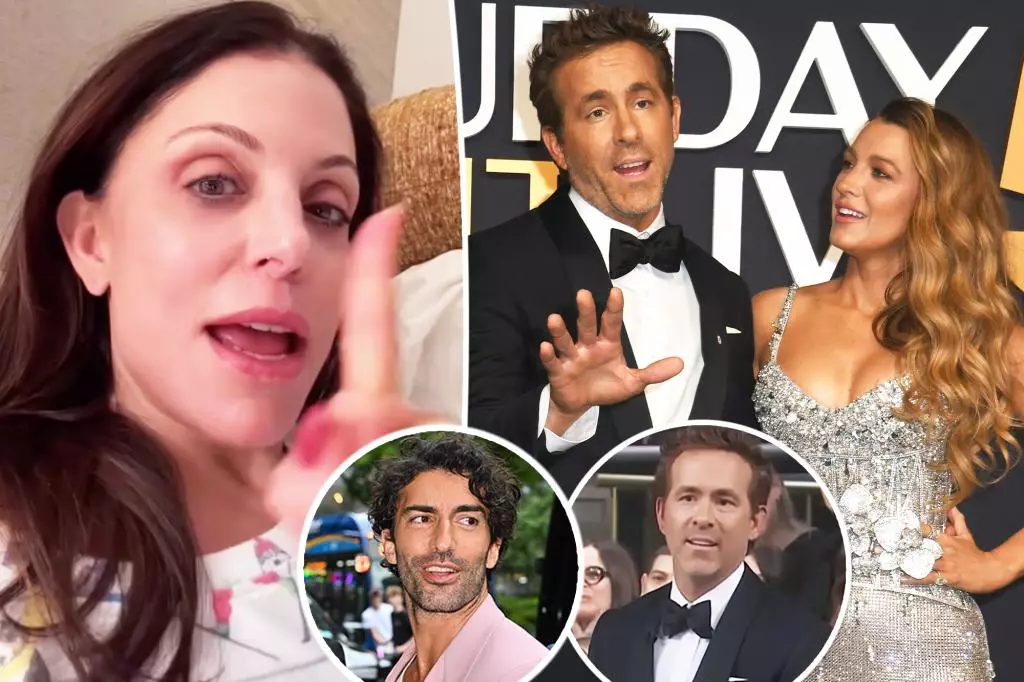In the world of celebrity culture, where every action is scrutinized and analyzed, Blake Lively and Ryan Reynolds have made headlines not just for their individual achievements but also for their dynamic as a couple. Their recent appearance on “Saturday Night Live” (SNL) in the midst of a legal dispute with Justin Baldoni has sparked both admiration and criticism. Notably, Bethenny Frankel, an icon in reality television, lauded Lively and Reynolds for what she described as a “brilliant” move, showcasing how they managed to transform a contentious situation into a marketing opportunity. However, this incident raises essential questions about the interplay between celebrity, public perception, and legal accountability.
Turning Controversy into Capital
The decision by Lively and Reynolds to attend SNL, especially with the ongoing allegations against Baldoni, has been seen as a strategic move that capitalizes on their status as Hollywood’s power couple. Bethenny Frankel’s enthusiastic endorsement of their actions highlights a broader understanding in the entertainment industry where media appearances can often overshadow the severity of real-life dramas. She remarked on TikTok that their participation was a “great marketing idea,” emphasizing that not everyone is privy to the intricacies of celebrity legal battles.
Indeed, the power couple’s involvement during SNL’s 50th anniversary posed them not just as figures entangled in legal disputes but as relatable personalities who can laugh at their predicaments. This aligns with modern public relations strategies that often encourage celebrities to maintain visibility, even amidst adversity. By participating in such a high-profile event, Lively and Reynolds could be influencing public opinion, steering the narrative away from negativity and toward a more humorous interpretation of their circumstances.
However, the reactions to Blake Lively and Ryan Reynolds’ appearance reveal a duality in public perception. While Frankel champions the move as a demonstration of resilience, others caution against interpreting the situation lightly. Industry insiders have insinuated that the couple may be trivializing serious allegations in a public forum. Their presence on a platform like SNL could be perceived as undermining Baldoni’s experience and the gravity of the legal proceedings. The statement from sources expressing that “it’s plausible Justin’s legal team will use this public outing” as leverage illustrates a significant concern: that humor may not be the best approach amidst legal strife.
This phenomenon isn’t new; celebrities often find themselves walking a tightrope between maintaining public favor while addressing personal crises. The nuances in this case underscore the importance of context. While some audiences may celebrate the ability to laugh in the face of adversity, others may view it as inappropriate, detracting from the seriousness of legal allegations.
Public Sentiment and Celebrity Responsibility
Furthermore, there is an inherent responsibility that comes with celebrity status, particularly when serious allegations involve allegations of misconduct. Lively’s initial hesitation to attend the SNL event speaks volumes about her understanding of the situation. People in the public eye must navigate an intricate landscape, balancing personal truths with public responsibility. A source indicated that both Lively and Reynolds left SNL feeling unburdened and without regrets. Yet, one might question whether this sentiment overlooks the impact of their actions on others involved in the case.
The echoes of their decision resonate beyond the immediate audience of the show. As trials and legal matters unfold, public sentiment can play a pivotal role, influencing jury perceptions and societal attitudes toward issues of harassment and accountability. While Lively and Reynolds thrive off their charming personas, it is crucial to consider the broader implications of their public appearances in light of ongoing legal disputes.
As the trial date draws closer—set for March 9, 2026—the implications of this case on Lively, Reynolds, and Baldoni are yet to be determined. The converging paths of celebrity culture and legal disputes demand a reevaluation of how public figures can manage their narratives while respecting the gravity of legal matters. Lively and Reynolds may very well succeed in their public relations strategy, but it also raises pivotal conversations about ethics, perceptions, and the responsibility of those in the limelight.
In an era dominated by social media and instant reactions, Lively and Reynolds’ SNL appearance serves as a case study on how celebrity culture navigates the complexities of personal crises. They may have capitalized on their charm and wit to traverse a turbulent time, yet the conversation around legal accountability and the serious nature of allegations persists, illustrating the intricate dance between personal narrative and public perception.

Leave a Reply